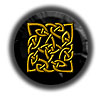 henever I have the privilege of reading or hearing Dr. Peter Leithart, my mind is down paths of symbology in and connections between various parts of the Bible. This past weekend my church hosted a Theopolis Institute regional course where Dr. Leithart spoke on how Christians should worship God, and today on Sunday he preached a sermon: a pre-Pentecost sermon on a Pentecost theme. That sermon inspired these thoughts.
henever I have the privilege of reading or hearing Dr. Peter Leithart, my mind is down paths of symbology in and connections between various parts of the Bible. This past weekend my church hosted a Theopolis Institute regional course where Dr. Leithart spoke on how Christians should worship God, and today on Sunday he preached a sermon: a pre-Pentecost sermon on a Pentecost theme. That sermon inspired these thoughts.Acts bears many thematic similarities to Genesis, so much so that it might be consider a new Genesis for a newly initiated creation. The similarities are not just in starting out by recounting a new beginning, a new creation immediately following Christ's triumph over death, his perfect substitutionary sacrifice fulfilling the demands of justice and righteousness, his resurrection, and the gift of the Holy Spirit at Pentecost, but in several of the themes of the overall story. Here are some that spring to mind in succinct, undeveloped form.
Acts begins with the Spirit moving over the face of the waters (in the Bible, one of the things "waters" often symbolically represent Gentiles, or the nations of the world) at Pentecost. The disciples receive the Holy Spirit and Jews from all nations hear prophetic word in their own native language. The Church in Acts is continuing Jesus's creative-redemptive work of separation and re-creation such as turning people and places from darkness to light.
In Acts, in Peter's rooftop lunchtime dream, we read about all kinds of animals enclosed in a sheet or some sort of vessel: you might say an ark, though they are not enclosed in an ark of judgment but an ark of redemption. The sheet bearing all kinds of animals - specifically of kinds forbidden for food in old covenant law - coming from heaven, their created goodness is being returned to the Earth and re-affirmed in the new creation.
Acts recounts stories of otherworldly powers and humans sinfully interacting in the magic of Simon Magus and the Ephesian fortune teller.
In Acts we see a father of many nations, of sons more innumerable than the stars in the sky or the sand of the seashore, thanks to Paul's entrusted mission of bringing the gospel to the Gentiles and bringing many more sons into the Kingdom of God's Son.
Paul - Saul - is somewhat like a new Joseph. He starts as a favored son of Israel: a Jew of the Jews, zealous for the law, raised in the strictest tradition of the Pharisees. We are first introduced to Saul receiving the coats of Stephen's murderers: coats of many colors. Acts ends with Paul, having been sold over by his brethren the Jews to the most powerful nation of the time, holding court in the nation of that dominant foreign power, receiving Jews and Gentiles and proclaiming life and good news to them.
Is symbology such as this circumstancial? Do associations like these mean anything, especially in a world where there is nothing new under the sun? God does not waste words. He communicates in signs and symbols. All things were created by God, were created by His word and so are endued with His language: sometimes distorted by the corrupting misues of sin, sometimes not seen or heard due to blindness of the eyes or dullness of the hearing. Even if a particular perceived symbology is tenous at best, its beauty, richness, and wonder delight us and enhance our joy in the receiving of God's Word, like good and beautiful poetry.
| Permalink


 Sunday April 25th 2021
Sunday April 25th 2021 E l s e w h e r e
E l s e w h e r e